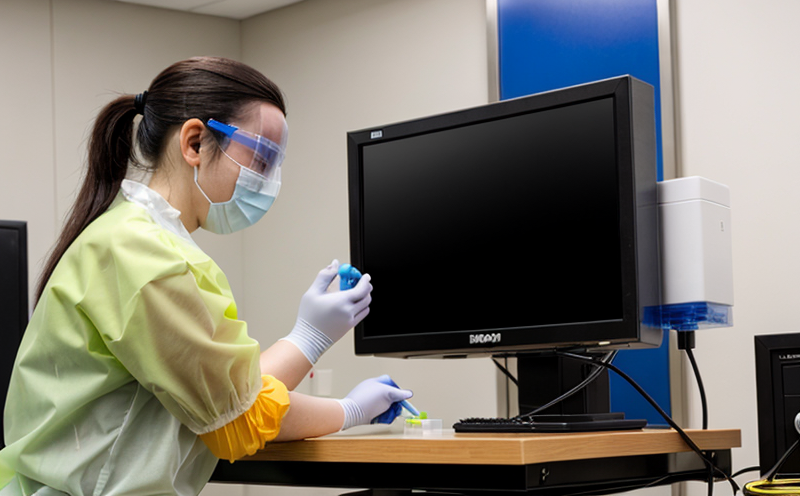Biocompatibility Testing of Wound Dressing Materials
The biocompatibility testing of wound dressing materials is a critical process in ensuring that medical devices are safe and effective when used on human tissues. This test evaluates the potential biological response of the material to the body, which includes assessing for any adverse effects such as irritation, inflammation, or toxicity. Compliance with this requirement ensures patient safety and regulatory adherence.
Wound dressings play a crucial role in the healing process by protecting the wound from external contaminants while providing an optimal environment for tissue repair. The materials used in these dressings must be biocompatible to avoid interfering with natural healing processes or causing harm. This testing involves several steps, including selecting appropriate test specimens, preparing them according to standard protocols, and conducting tests under controlled conditions.
The primary goal of biocompatibility testing is to determine whether the material can be safely used in contact with human tissues without adverse effects. The tests are conducted using international standards such as ISO 10993-4 (Biological evaluation for medical devices), which provides guidelines on how to perform tests and interpret results.
During the test, different types of biological interactions between the material and the body are evaluated, including cellular responses, inflammatory reactions, and any potential systemic effects. The results provide valuable insights into the safety profile of the wound dressing materials, helping manufacturers make informed decisions about product development and regulatory compliance.
The process begins with selecting the appropriate test specimens that represent the intended use of the material in a wound dressing. Once selected, these specimens undergo rigorous preparation procedures to ensure consistency and accuracy. The next step involves conducting various tests using different biological models such as cell cultures or animal studies to assess potential adverse effects.
After completing all necessary tests, the data is analyzed according to predefined acceptance criteria specified by relevant standards like ISO 10993-4. Compliance with these criteria indicates that the material meets biocompatibility requirements and can be considered safe for use in wound dressings. However, it's important to note that even if a material passes all tests, ongoing monitoring is still necessary due to potential long-term effects.
Biocompatibility testing of wound dressing materials is essential not only from an ethical standpoint but also legally required by various regulations worldwide. For instance, in the European Union (EU), Directive 93/42/EEC requires manufacturers of medical devices to demonstrate compliance with biocompatibility requirements before placing products on the market.
By performing thorough biocompatibility testing early in the product development cycle, companies can identify potential issues and address them proactively. This approach helps reduce risks associated with non-compliant products reaching patients, thereby protecting both public health and corporate reputation.
- Selection of appropriate test specimens
- Rigorous preparation procedures for consistency and accuracy
- Variety of tests using different biological models to assess potential adverse effects
- Data analysis according to predefined acceptance criteria specified by relevant standards like ISO 10993-4
- Compliance with biocompatibility requirements as part of legal obligations worldwide
Eurolab Advantages
At Eurolab, our expertise in medical device testing is unmatched. With years of experience and state-of-the-art facilities, we offer comprehensive services tailored to meet the unique needs of each client. Our team comprises highly qualified professionals who stay updated on the latest industry trends and regulatory requirements.
- State-of-the-art facilities equipped with advanced instrumentation
- Affordable pricing structure that offers exceptional value for money
- Quick turnaround times to ensure timely delivery of results
- Comprehensive range of services covering all aspects of medical device testing
We understand the importance of accuracy and reliability in biocompatibility testing, which is why we adhere strictly to international standards such as ISO 10993-4. Our commitment to quality ensures that clients receive accurate results every time, enabling them to make informed decisions about their products.
In addition to our technical capabilities, Eurolab also prides itself on excellent customer service and support throughout the entire testing process. From initial consultation to final report delivery, we are committed to providing a seamless experience for all our clients. By choosing Eurolab, you can trust that your medical device will undergo rigorous biocompatibility testing conducted by experts in their field.
Why Choose This Test
The importance of biocompatibility testing cannot be overstated when it comes to ensuring the safety and efficacy of wound dressing materials. Here are some key reasons why this test is crucial:
- To ensure compliance with regulatory requirements globally
- To identify potential risks early in the product development cycle
- To protect public health by reducing the risk of adverse effects from non-compliant products reaching patients
- To enhance corporate reputation through adherence to high ethical standards
- To provide valuable insights into the safety profile of new materials and formulations
- To support ongoing monitoring and improvement based on test results
By incorporating biocompatibility testing into your product development process, you demonstrate a commitment to patient safety and regulatory compliance. This not only helps protect your brand but also fosters trust between healthcare providers and patients.
Quality and Reliability Assurance
At Eurolab, we take pride in maintaining the highest standards of quality and reliability in all our services. Our commitment to excellence is reflected in every aspect of biocompatibility testing:
- We adhere strictly to international standards such as ISO 10993-4
- Our highly qualified professionals stay updated on the latest industry trends and regulatory requirements
- We use state-of-the-art facilities equipped with advanced instrumentation
- Rigorous quality control measures are implemented throughout the testing process
- Comprehensive documentation ensures traceability of results and compliance with regulations
The accuracy and reliability of our test results are paramount, as they directly impact decisions made by clients regarding product development, regulatory submissions, and market entry strategies. By choosing Eurolab for your biocompatibility testing needs, you can rest assured that you're partnering with a trusted expert in the field.





